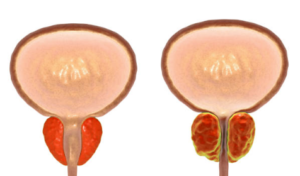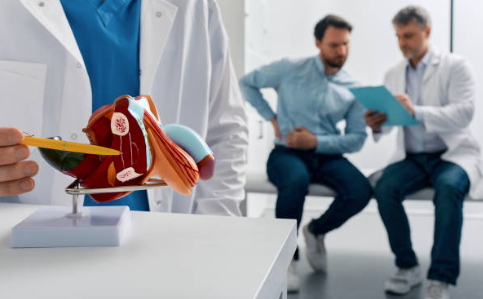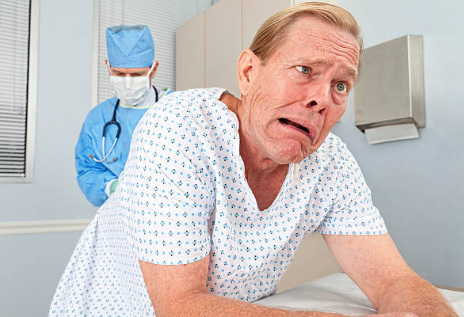Benign Prostatic Hyperplasia: Your Quick Guide to Symptoms, Treatment, and Relief

Your Quick Guide to Understanding and Conquering Benign Prostatic Hyperplasia (BPH)
Are you a man over 40 experiencing a change in how you urinate? You might be dealing with benign prostatic hyperplasia (BPH). BPH is a prevalent condition affecting millions, and you don’t have to just live with it. Let’s unravel BPH and explore ways to manage it effectively.
What Exactly is Benign Prostatic Hyperplasia?
Simply put, benign prostatic hyperplasia is the medical term for an enlarged prostate. Your prostate, a walnut-sized gland located below your bladder, plays a crucial role in reproduction. As men age, it’s normal for the prostate to grow, but sometimes this growth becomes excessive, leading to BPH.
Crucial Question: What Causes Benign Prostatic Hyperplasia?
While the exact cause remains somewhat unclear, experts believe hormonal changes associated with aging play a significant role in prostate enlargement.
BPH Warning Signs: Don’t Ignore These Symptoms
An enlarged prostate can squeeze the urethra (the tube carrying urine out of your body), causing a range of urinary symptoms. If you’re experiencing any of these, it’s important to see your doctor, as they could indicate BPH:
- Frequent urination: The nagging urge to go, especially at night. Do you find yourself waking up multiple times to use the bathroom?
- Weak urine stream: You might have trouble getting started or feel like it takes forever. Has your urine flow changed or weakened?
- Difficulty emptying your bladder: The feeling that you still need to go, even after urinating. Do you feel like your bladder never fully empties?
- Urgency: The sudden, overwhelming need to urinate. Are you rushing to the bathroom for fear of an accident?
- Hesitancy: A delay before the urine stream starts. Do you find yourself waiting and straining to start urinating?
Important Note: While these symptoms are commonly associated with BPH, they can also indicate other health conditions. It’s essential to get a proper diagnosis from your doctor.
Unveiling the Mystery: Benign Prostatic Hyperplasia ICD 10
If you’ve been diagnosed with BPH, you might have seen “benign prostatic hyperplasia ICD 10” on medical records. ICD-10 stands for the International Classification of Diseases, 10th Revision, a globally recognized system for classifying medical conditions. The code for BPH is N40.
The Anxiety of Diagnosis: How is Benign Prostatic Hyperplasia Diagnosed?
Worrying about prostate issues is completely normal, especially if you’re experiencing bothersome symptoms. Here’s what you can expect during the diagnostic process for BPH:
- Conversation with your doctor: They’ll ask detailed questions about your symptoms, how long you’ve had them, and your overall medical history. Be open and honest about what you’re experiencing.
- Digital rectal exam (DRE): While this exam might sound intimidating, it’s a quick and relatively painless way for your doctor to assess the size and shape of your prostate.
- Further testing: Depending on your symptoms and initial exam, your doctor may recommend additional tests. These could include:
- Urine tests: To check for infections or other urinary problems.
- Blood tests (like the PSA test): The PSA (prostate-specific antigen) test can help screen for prostate cancer, though an elevated PSA doesn’t always mean cancer.
- Imaging like an ultrasound: To get a visual image of your prostate and bladder.
The Power of Knowledge: Understanding Benign Prostatic Hyperplasia Pathophysiology
The pathophysiology of BPH involves the complex interplay of hormones, cell growth, and inflammation within the prostate gland. It’s more than just size increase, changes in smooth muscle tone within the prostate can also make symptoms worse.
Your Best Defense: Proactive Benign Prostatic Hyperplasia Treatment
Good news! BPH is treatable, and the right approach depends on the severity of your symptoms:
- Watchful waiting: For mild symptoms, monitoring the situation may be the first step.
- Lifestyle changes: Simple measures like reducing fluids before bed and bladder training can help.
- Medications: Several categories exist, some relax the prostate, others help shrink it.
- Minimally invasive procedures: Offer relief with less downtime than traditional surgery.
- Surgery: Recommended for severe symptoms or when other options fail.
Benign Prostatic Hyperplasia Treatment: The Quest for Natural Relief
Besides conventional treatment, many men seek natural remedies. While some may offer minor symptom relief, it’s crucial to discuss these with your doctor before starting any supplements or drastic dietary changes.
Don’t Despair: Benign Lymphoid Hyperplasia vs. BPH
Benign lymphoid hyperplasia is a rare, non-cancerous condition affecting lymph nodes. It’s quite different from BPH. Confusing? Don’t worry, your doctor will clarify any diagnoses.
Life Beyond BPH: Regaining Control
BPH doesn’t mean your life is over. With the right treatment and management, you can regain control of your urinary health and live life to the fullest.
Let’s Talk! Do you have questions or concerns about BPH? Feel free to share your experiences. Remember, together we can demystify this common condition.

FAQs: Your Benign Prostatic Hyperplasia Questions Answered
FAQ-1. I’m a man over 50, and my urination has changed. Could this be BPH?
Absolutely. The symptoms you describe are classic signs of BPH. While it’s a common condition as men age, it’s crucial not to self-diagnose. See your doctor for a proper evaluation to rule out other potential causes of your urinary changes.
FAQ-2. What’s the difference between BPH and prostate cancer?
Both BPH and prostate cancer involve changes in the prostate, but they are very different conditions. BPH is non-cancerous, while prostate cancer is a potentially serious disease. Some symptoms can overlap, which is why consulting with a doctor is so important.
FAQ-3. Is the digital rectal exam (DRE) absolutely necessary?
While it may seem awkward, a DRE is a quick and valuable tool for your doctor to assess your prostate. It helps them determine the size and feel for any irregularities. If you have concerns, discuss them openly with your doctor.
FAQ-4. How do I know if I need treatment for BPH?
Treatment necessity depends on how much your symptoms impact your quality of life. If they are mild and manageable, your doctor may recommend monitoring. But if they significantly disrupt your daily activities or sleep, treatment could offer crucial relief.
FAQ-5. Are there any natural remedies that can truly help with BPH?
While some supplements claim to help BPH, their effectiveness is often limited. It’s essential to talk to your doctor before starting any natural remedies, as they could interact with medications or have other side effects.
SEE ALSO: Latest Prostate Supplements >>

